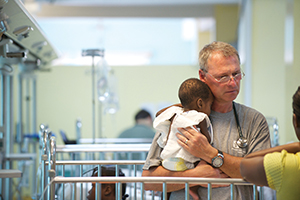By participating in nearly 100 humanitarian mission trips, pediatric emergency medicine physician Jeff Kempf dedicated his career to providing as many services as possible to children around the globe.
As a kid, Jeff Kempf was given a book about Tom Dooley, an American physician who was known for providing humanitarian care, primarily in Southeast Asia prior to the Vietnam War. The book so impacted Kempf that he knew he wanted to be a doctor. After graduating from the University in 1978 with a degree in biology, he stayed in town, earning a medical degree from A.T. Still University-KCOM. In a career spanning five decades, he has followed in the footsteps of Dooley, offering care to countless children in the U.S. and abroad.
After completing an internship and general pediatric residency, Kempf took a public health position in Florida, primarily to alleviate the debt from his education. His job put him in close proximity with indigent patients, giving him insight into the pitfalls of the medical establishment.
“I found it to be an incredibly fulfilling job,” he said. “It opened my eyes to how health care is very unevenly distributed in our country.”
After marrying Ellen, his wife of 37 years and a fellow pediatrician, Kempf relocated to Ohio to pursue a subspecialty in emergency medicine. He went on to serve for 30 years in the emergency department at Akron Children’s Hospital. Kempf did not confine his medical talents to the Buckeye State. He and Ellen devoted their time to medical mission trips around the world, including Kenya, Belize, Ethiopia and Haiti. In total, Kempf estimates he has participated in some capacity on nearly 100 humanitarian efforts.
“I do believe that health care should be a human right, for every human, not only in the United States, but in the world,” he said. “That should be a universal goal for all of us.”
In 2012, Kempf was approached by Gift of Life Northeast Ohio, a nonprofit organization that serves children and their families from developing nations who do not have access to cardiac care. Kempf’s desire to provide health care to all those who need it, along with his experience on medical mission trips, gelled nicely with the goals of the organization. Together, they looked to not only provide services in developing areas, but also create an infrastructure that would eventually allow those destinations to be self-sufficient.
Last year, Kempf’s efforts received recognition in the documentary film “Open Hearts,” which tracked a mission trip to Haiti. The finished product, both uplifting and agonizing, showcased an international team of doctors choosing from hundreds of potential patients a dozen who would receive lifesaving care.
“There are kids who are going to die before we come back. That’s the reality of it,” Kempf said. “At the end of the day, our job is to provide help for those that we can and have a little bit of faith that we make the right choices.”
Kempf’s role on the trips, and well documented in the film, is to coordinate the many moving parts involved in bringing an international team together for a relatively short time period to treat critically ill patients. He also managed to sneak in a game of Candyland with one of the children. For his efforts, the film – available at openheartsfilm.com – cites Kempf as a producer, something that came as a surprise to him.
“I certainly wasn’t a film producer, other than I showed up,” he said.
After his retirement, Kempf planned to volunteer his medical expertise, however, a recent ailment has him on immunosuppressant medication, limiting his potential avenues of service during the pandemic. He still volunteers in other ways, and he plans to one day return to mission trips and other medical service.
“I’m still incredibly hopeful that someday I will get back,” he said. “The way we get better, the way our country can really make life better for all of us, is to raise all of us up together. To have community involvement and civic improvement starts at the bottom up.”


